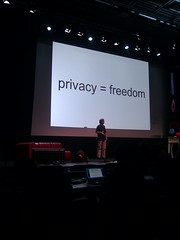LIFT 2010: Privacy and Identity sessions
Mutual privacy and online distributed social identities, Olivier Glassey
Is "public" the new social norm? "Apparently" privacy is ending, is this maybe wishful thinking sponsored by the large harvesters of personal data? There's a false assumption about digital natives, that they don't know/care/do anything about privacy online.
Many people are still playing with their identity online and working out the connections between it and their "real world" identity. Most people will accept friend requests from people they don't know. Also references the Burger King Whopper Sacrifice site.
Much of our identity online isn't down to us, it's down to the framing we get from the types of communities we enter - e.g. beautifulpeople.com, which expels users who no longer meet the community's standards of good looks.
We all switch roles regularly in everyday life - we speak differently to strangers, colleagues, parents, friends. How do we account for this in technical privacy control settings, which are frequently "black boxes" for users?
Bearing this in mind, how "social" are online social networks, anyway? They seem to be missing key elements of real-world sociality - the constant changing of roles, for instance. Can a coherent personal presentation be built, given these sorts of restrictions? We need social memory and social amnesia; forgiveness at different scales (for e.g. individual reputation, youth protection, and criminals who've repaid their debt to society).
 Post-privacy, Christian Heller
Post-privacy, Christian Heller
Believes that privacy as a guaranteed personal space, free from outside view, is gone. Privacy will survive as an exception not the rule.
We consider that privacy = freedom. I think this is flawed. In a medieval village, no-one had any expectation of privacy; there was a strict self-control driven by constant observation from others. Those not obeying community rules was caught and punished. The nobility had entirely public lives: all details were public and political. The post-Renaissance middle class had no private spaces, with everyone sleeping in the same room (or same large bed). Later rooms were separated by function or owner (e.g. dining room, or room where the servants sleep). Private personal spaces developed from this environment.
Male/female roles map to public/private: woman stays at home, whilst man goes out to earn, vote, participate in public discourse. Female emancipation suggests that the "privacy = freedom" equation is not enough... because private spaces can be isolating. The sexual revolution of the 20th century was about taking much private content and making it public; the gay movement is another example of privacy (where homosexual acts were tolerated) being isolating/limiting.
All examples where taking things from private to public can be positive.
Nowadays we can choose a society to which we already conform (e.g. online S&M communities) rather than being forced to live in the society in which we reside.
PatientsLikeMe.com - all about opening up the healthcare system by having patients share their data.
Privacy has been associated with rights, e.g. self-determination. We have a perception that information about me can be used to exert power over me; urban CCTV is an example of social pressure applied through gathering of information. Privacy activists typically combat this through data protection legislation, but rigorous enforcement of this implies DRM for all data about people. Instead, we need to consider the ways we can use openness for our benefit and work against tendencies that threaten our freedom: bring things into the open to enforce tolerance for them.